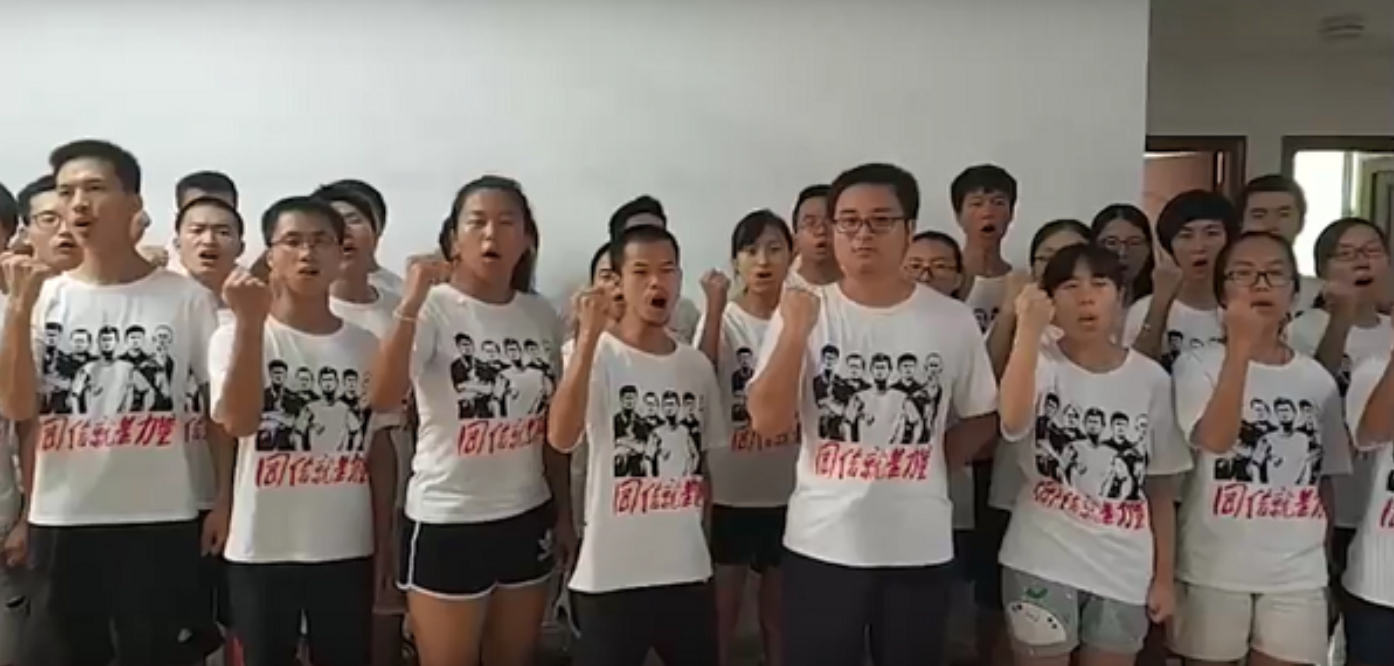One of China's top universities, Peking University, has turned up the heat on its student Marxist Society and threatened to shut it down, despite the country being nominally communist.
Not allowed to re-register
According to the Financial Times, the university's Marxist Society was not able to re-register for the new academic year after failing to get the backing needed from teachers.
The society said teachers had turned down their request for support with registration, without giving any explanation.
And while a teacher had wanted to register the society for them, his offer was rejected by the university's Student Society Committee.
The society added that "everyone can see what [it] has done over the past few years to speak out for marginalised groups on campus".
[related_story]
Arrested for speaking up on workers' rights
The society's failure to re-register could be linked to its support for workers' rights.
According to Financial Times, the Marxist Society had started investigating low-income workers' working conditions at Peking University this year.
They had earlier gained media attention in 2015 when they published a report related to the issue.
In August, one of its members, Zhan Zhenzhen, was arrested together with other students for supporting the workers at Shenzhen's Jasic Technology who wanted to form a union to fight for greater workers' rights.
Earlier in July, after two weeks of protests, 29 people including workers and their families were arrested, according to Reuters.
Workers' rights a touchy issue
The Chinese government is facing not only protests from workers who demand better pay and safer working conditions, but also calls for greater union representation from workers and activists alike.
Such protests are not tolerated by the ruling Communist Party, which is against independent labour action, according to Reuters.
And the only legal trade union in China -- the All-China Federation of Trade Unions -- was accused of being more responsive to the demands of the management than the workers.
Annoying the authorities further are students from Peking University and other top universities -- Tsinghua University, Nanjing University and Sun Yat-sen University -- who are lending their support to the workers' cause.
 Image via China Worker
Image via China Worker
Hundreds of them wrote open letters on social media in support of the workers.
Many of them chose to highlight the plight of the workers as "today's students are tomorrow's workers".
In addition to Peking University's Marxist Society being unable to re-register itself, other university Marxist groups were targeted too.
In November 2017, six participants -- four students and two alumni -- attending a Marxist-inspired reading group that focused on improving the plight of factory workers at Guangdong University of Technology were arrested for allegedly "gathering crowds to disrupt social order".
A break from the past?
Marxism is enshrined in both the party's and the state's constitutions.
The German revolutionary socialist Karl Marx had advocated for the rise of the workers against the elite ruling class who own the means of production.
But this particular strain of thought touches on a particularly sensitive political nerve now in China.
Which is why, ironically, Chinese workers think that the government is failing to protect their rights, despite China adhering to Marxism-Leninism officially.
In fact, the China today seems more 'capitalist' than 'communist'.
Some experts say that it has long left behind Marx's beliefs in class struggle when it embarked on a slew of market-oriented reforms in the late 1970s.
These reforms eventually led China to become the world's second-largest economy.
And China under Xi, is said to have followed the Communist Party-centric structure of Leninism more closely than Marx's theories, according to Richard McGregor, a senior fellow at the Lowy Institute.
While the old Communist Party slogan that says "Long live the working class" served its purpose in inspiring a political uprising from the 1920s to the 1940s against the Kuomintang -- such an ideology probably does not fit their present trajectory well.
Marx as a tool?
Not too long ago, Chinese President Xi Jinping visited Peking University on the 200th anniversary of Karl Marx's birth and thanked the university for promoting the theory.
China's national rejuvenation cannot be achieved without theoretical thinking; Marxism has always been the guiding ideology of our Party and country: Xi #KarlMarx200 pic.twitter.com/gCIOHabY1N
— People's Daily, China (@PDChina) May 4, 2018
However, analysts say the celebrations of Marx's birth are not really about Marx himself, but rather, confidence in China's own political model and the Party's legitimacy.
Xi Jinping Thought?
A more ideal ideology than Marx's in the current political climate would probably be Xi Jinping Thought on Socialism with Chinese Characteristics for a New Era, or Xi Jinping Thought for short.
As with Mao Zedong Thought and Deng Xiaoping Theory, the political thought named after Xi was written into the Chinese constitution in 2017.
The broad concept can be distilled into 14 principles.
While most of them are pretty vague, such as treating the "ecological environment" as they treat "life", the central tenet of Xi Jinping Thought is arguably the Party's supreme authority in leading China.
The focus has therefore shifted from the working class in Marxist theory, to the Communist Party itself in Xi Jinping Thought.
The Party has also promoted Xi Jinping Thought as the "Marxism of modern China".
Xi over Marx
Since Xi introduced his Thought, the country has clamoured to promote it.
Already, more than 20 universities had set up research centres that aim to teach the concept, including Peking University.
Many universities have also made "Xi Thought" the central focus of their curricula.
With the ongoing sensitivities towards Marxist-related gatherings, and the rapidly rising popularity of Xi Jinping Thought, institutions that teach the latter are expected to increase in number and overtake those that teach the former.
In the meantime, workers' protests are likely here to stay.
You can watch a video of the supporters of Jasic Technology's workers protesting their detainment here:
Top image via China Internet Information Center
If you like what you read, follow us on Facebook, Instagram, Twitter and Telegram to get the latest updates.
